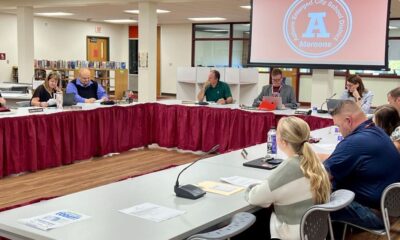Education
Empower Your Child to Choose the Right College Effectively

Deciding on a college can be overwhelming for students and their parents. Each child approaches the selection process differently, as demonstrated by one parent’s experience with her three children. Emily Morrison, a parent navigating this journey, shares valuable strategies to help guide students in making informed decisions about their future educational paths.
Identifying Priorities
The first step in this journey is helping children isolate their top priorities. Every student has distinct preferences that influence their college choices. Parents can play a crucial role by observing and discussing what factors matter most to their child. Whether it’s a preference for a small or large institution, a rural or urban setting, or the type of curriculum offered, these discussions can clarify priorities.
Engaging in this conversation allows students to articulate their needs. Questions such as whether they prefer a liberal arts college or a trade school, or if they need online options, help narrow down the search. Once a starting point is established, the search for suitable colleges becomes more manageable.
Encouraging Ownership in the Process
Parents should emphasize the importance of students taking an active role in their college search. While parents can suggest potential schools, it is essential for students to research and evaluate their fit. This can include virtual tours, online resources, or even meetings with current students and admissions counselors.
Encouraging networking can further enhance their understanding of different institutions. Students who engage in the process are more likely to feel a sense of ownership over their decisions, which can lead to a more fulfilling college experience.
Understanding Financial Implications
The financial aspect of attending college is a critical consideration. In the United States, the cost of a college education has reached staggering levels, with families needing to budget around $200,000 for a moderately priced university after loans, financial aid, and scholarships. Parents should have open conversations about what they can afford and what they expect their children to contribute.
Filing the Free Application for Federal Student Aid (FAFSA) is an important step in determining eligibility for financial aid. Early discussions about finances can simplify the school selection process and help families create a realistic list of potential colleges.
The Importance of Early Applications
Encouraging students to apply early can provide them with more options and reduce last-minute stress. Early applications allow students to explore their choices before making final commitments. Morrison’s experience with her eldest two children applying under early decision illustrates the benefits of proactive planning.
Reminding students that it’s acceptable to apply to reach schools can also inspire ambition. Dreaming big is encouraged, but starting the application process early can make a significant difference when spring arrives and peers begin to scramble.
Ultimately, choosing a college is a significant decision, but it is also one that can lead to rewarding experiences. Wherever students choose to attend, their engagement and effort will largely determine their satisfaction and success. Parents can rest assured that maintaining communication will support their child’s journey as they transition into this pivotal stage of life.
-

 Technology4 months ago
Technology4 months agoDiscover the Top 10 Calorie Counting Apps of 2025
-

 Health2 months ago
Health2 months agoBella Hadid Shares Health Update After Treatment for Lyme Disease
-

 Health3 months ago
Health3 months agoErin Bates Shares Recovery Update Following Sepsis Complications
-

 Technology3 weeks ago
Technology3 weeks agoDiscover 2025’s Top GPUs for Exceptional 4K Gaming Performance
-

 Technology2 months ago
Technology2 months agoElectric Moto Influencer Surronster Arrested in Tijuana
-

 Technology4 months ago
Technology4 months agoDiscover How to Reverse Image Search Using ChatGPT Effortlessly
-

 Technology4 months ago
Technology4 months agoMeta Initiates $60B AI Data Center Expansion, Starting in Ohio
-

 Technology4 months ago
Technology4 months agoRecovering a Suspended TikTok Account: A Step-by-Step Guide
-

 Health4 months ago
Health4 months agoTested: Rab Firewall Mountain Jacket Survives Harsh Conditions
-

 Lifestyle4 months ago
Lifestyle4 months agoBelton Family Reunites After Daughter Survives Hill Country Floods
-

 Technology3 months ago
Technology3 months agoUncovering the Top Five Most Challenging Motorcycles to Ride
-

 Technology4 weeks ago
Technology4 weeks agoDiscover the Best Wireless Earbuds for Every Lifestyle





















